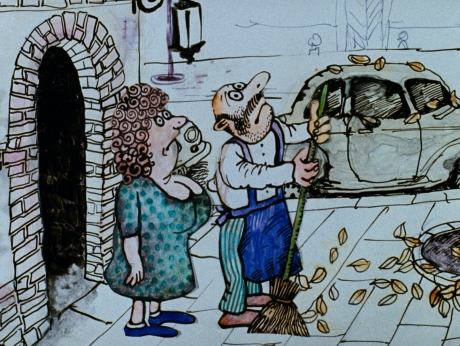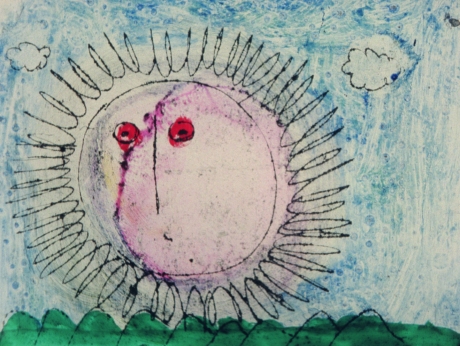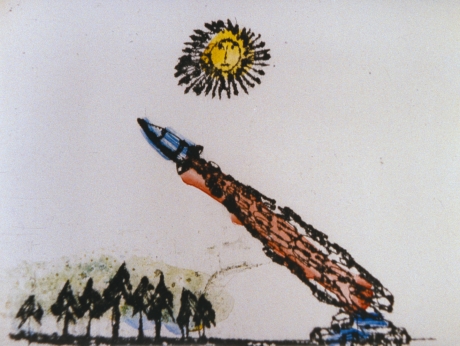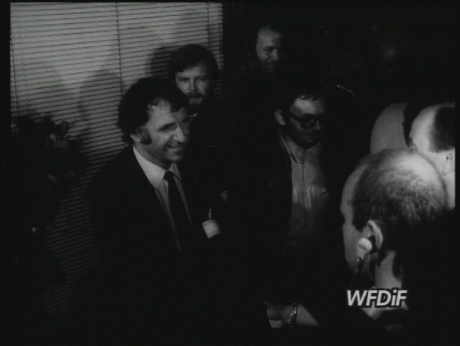
 overview
overview
About the film
Editor: Krystyna Makarewicz
Production Manager: Leszek Kachel
Production: Animated Film Studio (Cracow)
Rights: National Film Archive
Language: pl
hide tab

 storyline
storyline
A lovely autumn landscape. Silence, one can only hear birds singing. On the shore, covered with forest, an angler sits motionless. He is full of hope for a successful catch. Time is running, the fish does not catch. Suddenly from the trees behind the man’s back… a large, two-foot fish appears. When it sees the angler, it licks its lips with taste and quietly creeps towards him. It jumps at the surprised angler, swallows him along with his fishing rod and hops happily into the river. The fishing turns out to be extremely successful.
hide tab

 comment
comment
hide tab



















In his recipe for an animated film Aleksander Sroczyński names the following ingredients: horror, pure nonsense, surrealism, pop art, the Beatles plus a pinch of a few other things for taste. One of these things is eroticism, which has caused Sroczyński to gain the nickname “Porno-Olo” in The Animated Film Studio in Kraków, where he works. Black humour à la Topor (“but in colour” – he adds) is also very important, as are gags in the style of the Marx brothers, Keaton and Lloyd. And a bit of current satire. This electrifying mixture gives in effect films which are alive, crazy and full of surprises. The author precisely builds the tension – for example in the film “Fishing” we see the angler looking into the water for such a long time that we begin to get nervous when the cork trembles. However the resolution comes from a completely different side – from the back (…). This film is very short, as are most of Sroczyński’s animations – sometimes it seems that the credits last longer than the film itself. Krzysztof Stanisławski, Horror animowany, „Kino”, 1984, nr 5
Alexander Sroczyński is a graduate of the Academy of Arts in Cracow. Once asked to define the shortcut, he said: ASP – Aspirations of a Surrealistic Progeny, so an Alexander Sroczyński Production. Salvador Dali and Luis Buñuel are his masters. “Just like Buñuel I grew up in a regime-religious atmosphere. Just like him I became interested in surrealism” – he confesses. He also adds: “If I had to choose between Roland Topor’s or Piotr Skrzynecki’s sense of humour, I would choose Topor”.
His debut was in 1981 in the Animated Film Studio in Bielsko with the animation “One Can Hear More Than the Grass Grow”, which was at the same time his final work for the Academy of Arts in Cracow. Before his debut he was engaged in the making of films by other directors: Ryszard Lepióra („Hotel”, „The Through”, 1981), where he was the author of the artistic layout and Bronisław Zeman („8 i ¾”, 1981), where apart from the artistic layout he was also the co-scriptwriter.
In these short films, in their content, form, and visual arts, one can clearly see the type of cinema that Sroczyński later consequently made. Lepióra’s and Zeman’s films were funny stories, full of black humour (the title „8 i ¾” means that the film contains eight amusing animated blackouts plus one unfinished due to the tape break off). These were the realizations Sroczyński began his career with in the Animated Film Studio in Cracow. Before he made his flag film “Animated Film” (1982), which gave him a huge popularity and prestigious awards at festivals in Cracow, Chicago and Oberhausen, he realized two incredibly amusing animated miniatures: “Fishing” (1982) and “7.30 p.m.” (1982). Both of the films had a similar construction: a short introduction to the situation and a humorous, surprising punchline.
Sroczyński was successful in the paper-cut technique. He improved it a bit: the background on which the characters and objects move was first varnished and then oiled with vaseline: this way the cut-outs could easily move on the background, which enabled a greater tempo. This technique which he founded is called a grease picture. Due to it he partly proved that it is possible to combine a commercial film with authorial ambitions. “People who like to be seen as intellectuals despise of horror, criminal films, comedies. It’s a fashionable attitude. I guarantee that deep down they love these types of films. I am not ashamed of commercialism and I draw ideas from the despised kinds of films” – he said in one of interviews. Jerzy Armata.